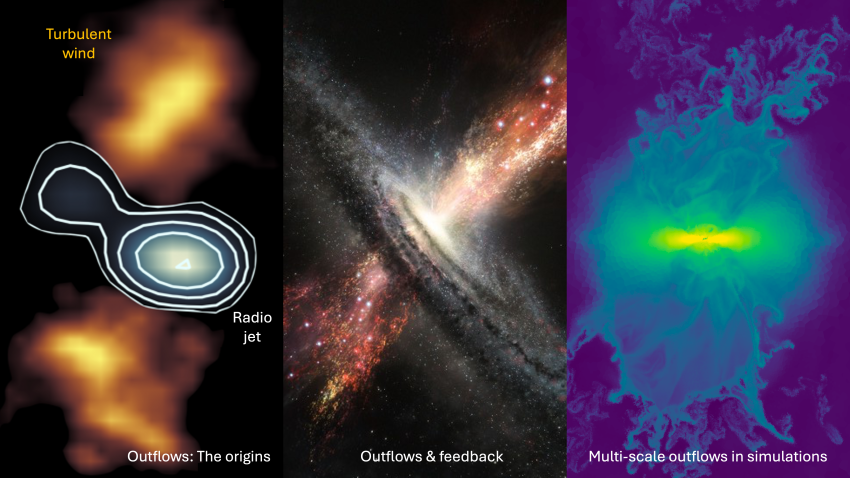Click here to get your Fellow Ticket
Click here to get your Non-Fellow Ticket
Outflows in galaxies hosting active galactic nuclei (AGN) are widely regarded as a key mechanism for removing gas from galaxies, potentially leading to the suppression of star formation over time. Over the past decade, the advent of advanced instruments on large telescopes has enabled observers to trace these outflows across multiple gas phases. At the same time, developments in numerical techniques have significantly advanced our ability to model AGN-driven feedback in cosmological and zoom-in simulations in the broader context of galaxy evolution. Observations and simulations are closely intertwined: empirical measurements—such as coupling efficiency, outflow kinetic power, and gas composition—serve as vital constraints for refining theoretical models and feedback prescriptions, while simulations provide crucial guidance for interpreting observational data. This specialist discussion aims to bring together observers and theorists working on AGN feedback, with a particular focus on researchers studying multi-phase outflows.
Organising this session is especially timely, given the growing number of observations of outflows in previously underexplored gas phases (e.g., warm molecular gas) in low and high-redshift galaxies via JWST. Combined with archival UV, optical, sub-mm and radio data, these multi-wavelength observations now allow us to assess the relative contributions of different gas phases to outflow rates, kinetic energy and coupling efficiencies. At the same time, advances in numerical techniques mean that simulations are spanning larger dynamic ranges and incorporating more realistic modelling of AGN radiation, winds and jets, alongside multiphase ISM prescriptions. Together, these developments allow for more direct and detailed comparisons across gas phases.
The specialist discussion will be structured into two sessions: one focused on observational studies and the other on theoretical perspectives.
- Observational Studies of Multi-Phase Outflows: This session will explore both spatially resolved and unresolved observations across various gas phases—ionised, cold molecular, warm molecular, and neutral, at both low and high redshift. Key questions include: What is the morphology or how extended are these outflows in each gas phase? What is the coupling efficiency in each phase?
- Theoretical Modelling of Multi-Phase Outflows: This session will highlight current efforts and recent advances in simulating multi-phase outflows, examining how realistic feedback processes interact with different gas phases and drive multi-phase outflows. Key questions mirror the observational counterpart: How well do theoretical predictions align with observations?
- Assessing the Impact of outflows: Across both sessions, we will discuss emerging evidence for the broader consequences of AGN-driven outflows, including their role in regulating star formation, altering molecular gas content, and redistributing metals within galaxies.
All times are in UK (London) time
===================================
10:00 – 10:30 = Tea/Coffee
10:30 – 10:35 = Intro (Darshan Kakkad & Martin Bourne)
10:35 – 11:00 = Debora Sijacki (Invited - Unravelling the Powerful Impact of Supermassive Black Holes with Cosmological Simulations)
11:00 – 11:15 = Alex Richings (Highlight - Modelling synthetic emission line observations to probe the physics of multiphase AGN outflows)
11:15 – 11:25 = Sophie Koudmani (AGN-Driven Outflows Across the Universe: Black Hole Feedback from High-Redshift to Dwarf Galaxies)
11:25 – 11:35 = Lucy Ivey (Hints of AGN Outflows in Early Low-Mass Galaxies? Comparing Observations and Simulations with AESOPICA)
11:35 – 11:45 = Sandra Zamora (Impact of black-holes and outflows on galaxy formation at high-z)
11:45 – 11:55 = Vivienne Wild (Extended MgII haloes around, and fast MgII outflows from, massive post-starburst galaxies)
11:55 – 12:05 = Alice Deconto-Machado (Multi-scale quasar outflows at cosmic noon)
12:05 – 12:15 = Marine Prunier (X-ray Cavities and Weak Shocks in the TNG-Cluster Simulation: Tracing AGN-Driven Outflows and Cluster Heating Channels)
12:15 – 12:25 = Salmoli Ghosh (Magnetised Outflows in Radio-Quiet AGN and their Influence on Host Galaxies)
12:30 – 13:30 = Lunch break
13:30 – 13:55 = Michele Perna (Invited - AGN-driven multiphase outflows: observational perspectives and challenges)
13:55 – 14:10 = Anelise Audibert (Highlight - Quiet but not silent: feedback from low-power jets in quasar host galaxies)
14:10 – 14:20 = Victoria Fawcett (Are dusty QSOs in a blow-out phase?)
14:20 – 14:30 = Simone Candini (Probing radio-quiet AGN feedback: Insights from ASKAP and GAMA)
14:30 – 14:40 = Luke Holden (The importance of AGN-jet-induced shocks in accelerating gas outflows)
14:40 – 14:50 = Enrica Bellocchi (The optical view of the X-ray Ultra Fast Outflow in the Narrow Line Sy1 IRAS17020+4544 seen with MEGARA/GTC)
14:50 – 15:00 = Matthew J. Temple (Linking ionised gas outflows and molecular gas depletion in type-1 quasars at cosmic noon)
15:00 – 15:10 = Lizzie Taylor (Outflows in 1.5 < 𝑧 < 5 post-starburst and recently quenched galaxies are likely relics from episodic AGN activity)
15:10 – 15:20 = Robert Pascalau (Winds of Quench: Revealing Spatially Resolved AGN-driven Outflows in Massive Quenched Galaxies at z>3 with NIRSpec/IFU)
15:20 – 15:30 = Closing Remarks
15:30 – 16:00 = Tea/Coffee
Abstract submission deadline 5th August: https://forms.gle/6JMjL4j6vLQ1jfm4A
Invited Speakers
Debora Sijacki (Cambridge, UK)
Michele Perna (CAB, Spain)
Organisers
Co-Chairs: Darshan Kakkad (d.m.kakkad@herts.ac.uk) & Martin Bourne (m.bourne@herts.ac.uk), University of Hertfordshire
SOC: Chris Harrison (NewCastle), Martin Krause (Hertfordshire), Raffaella Morganti (Groningen), Cristina Ramos-Almeida (IAC)


